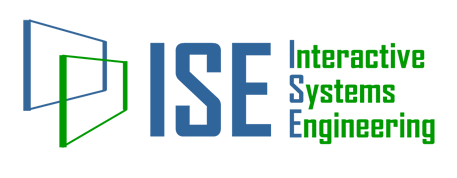This section provides an overview of the teaching activities conducted by our research group as part of the Bachelor’s Degree in Computer Engineering at the University of Castilla-La Mancha (UCLM). Our members are engaged in delivering specialized courses that incorporate both foundational knowledge and the latest advancements from our research areas.
General
Human-Computer Interaction I
The user interface is the visible part of computer applications. In the field of Human-Computer Interaction, the need for an adequate user interface is emphasized, ensuring that tasks for which the application was designed can be performed with ease. While aesthetics are important, the primary goal is always to facilitate user interaction with the application. Through the study and application of this subject, students will learn to develop applications with key, foundational considerations in mind, such as understanding the user, interaction mechanisms, and essential design principles.
Information Systems
This course introduces fundamental global concepts in Computer Science (engineering, abstraction, model, system, project, process, information) to progressively arrive at the concept of a computer system (hardware + software + data), and from there to the broader concept of an Information System (IS) as a specialized type of socio-technical system (with technological, human, social, and organizational elements) aimed at meeting the information needs of an organization.
With the course’s horizontal perspective on computing, students gain a clearer understanding of the role each area of Computer Science plays as part of the whole. This course also provides a foundational, both conceptual and practical, basis for later courses related to information systems, such as enterprise information systems, information systems management, information systems auditing, and software system security. In this sense, the course serves a preparatory purpose.
Databases
In the era of digitalization, the capture, processing, and retrieval of information have become key elements in most services. Computer engineers are aware of the need for efficient systems capable of managing large volumes of diverse information. Consequently, modern computing technology is inconceivable without an underlying database to help achieve its objectives. Technologies based on artificial intelligence, networks, web technologies, gaming, information systems, and more would not be feasible without effective database management.
Database management systems are therefore a fundamental component in information and communication technologies, essential for achieving the social reach that the internet and communications have today.
Software Engineering
This course provides an overview of Software Engineering and its role within the context of Computer Engineering. It introduces fundamental concepts as well as key characteristics and techniques to be applied across the various stages of software development: requirements, analysis, design, and implementation. All topics are approached from the Object-Oriented paradigm.
Software Engineering
Software Engineering Processes
The Software Engineering Processes course focuses on studying the methods, techniques, and tools that guide software engineers in developing software systems systematically to meet required quality standards. Special attention is given to software testing techniques, maintenance, and configuration management.
The course provides essential knowledge and skills for professional practice as a Software Engineer.
Software Design
This course is part of the Software Engineering Specific Technology subject area within the curriculum and serves as a foundation for the Software Engineer profession.
Information Technologies
Web Technologies and Systems
The evolution of communication infrastructures and the interconnection of computers through the Internet have transformed the way modern systems and applications are designed, implemented, and deployed.
The Web facilitates both the consumption and production of information, not only by users but also by systems.
This course focuses on providing the knowledge necessary to develop systems and applications that use the Web as an execution platform.
This knowledge includes both the technology required for accessing information and the Web’s capacity as a platform for interconnecting heterogeneous systems.
